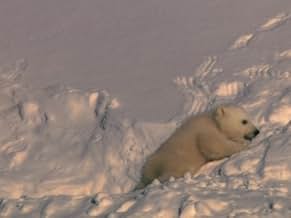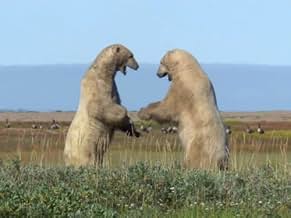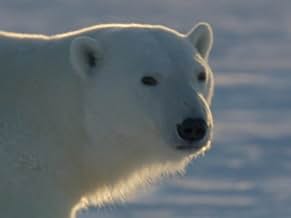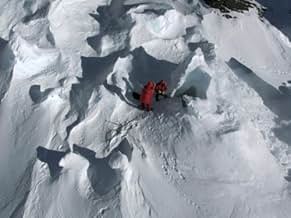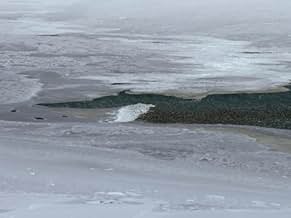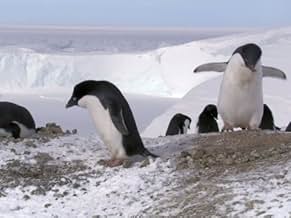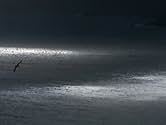Se centra en la vida y el medio ambiente tanto en el Ártico como en el Antártico.Se centra en la vida y el medio ambiente tanto en el Ártico como en el Antártico.Se centra en la vida y el medio ambiente tanto en el Ártico como en el Antártico.
- Ganó 4 premios Primetime Emmy
- 13 premios ganados y 9 nominaciones en total
Explorar episodios
Resumen
Reviewers say 'Frozen Planet' is acclaimed for its breathtaking cinematography and David Attenborough's engaging narration. The series excels in detailing animal behavior and adaptation, offering both educational and emotional value. Behind-the-scenes segments enhance appreciation for the production team's efforts in extreme environments. However, some note repetitive content and a slight focus on human impact, though these are minor compared to the series' overall quality.
Opiniones destacadas
I was fortunate enough to get the opportunity to work on the promotional campaign as an editor at Discovery Channel in 2011-2012, and is still one of my favorite projects to date. The only challenge I faced was trying to choose which visuals to use in the 60/30 second commercials, because they were all breath taking.
From start to finish, the production value, imagery and breathtaking landscapes are captured with perfection in this documentary series. I thoroughly enjoyed watching this series when I had to (work), and then watched it again when I wanted to (at home)!
Over all, well done!
Looking spritely as ever David Attenborough returned to the BBC with yet another brilliant documentary series, this time focusing on the seasons across the polar regions at either end of the earth. Spread over six parts, each season gets an episode followed by one on the lives of human in the regions and then an episode on how the regions have changed over time (and temperature). I'm not really a regular viewer of shows such as this, but I do come out for the big guns of the genre and the Attenborough/BBC names tend to be of the highest quality (plus the clip of the criminal penguin that was released as a promo convinced me to watch).
It is hard to fault Frozen Planet for what it does because it is technically impressive and stunningly filmed but yet has more than enough content and specifics to prevent the show being taken as just an excuse to show off your HD TV or have visual wallpaper for an hour (although having said that, it performs that task too and needs to be seen in HD). Although it covers a lot of ground, the show perfectly captures a sense of the extremes and of the remarkable forms of life that live in and around them, some we have seen before and some we have not and I found it as engaging to see familiar creatures as I did to learn of caterpillars that freeze completely solid only to thaw out and continue living when the ice retreats. As is to be expected, some of the presentation is a touch anthropomorphised but mostly the show is pretty honest about the chances of survival and is not afraid to show us the fates of creatures who are simply unlucky or misjudge their situation. Although one tries to watch it as a documentary it is hard not to feel something when you've just watched a baby bird survive a very rough landing on its first flight, only to be grabbed by a passing fox! The final two episodes are weaker by comparison because there is less of the animals and more of the human condition and bigger picture, but they are both fascinating. I came to the fifth episode not expecting much but the study of select communities did impress – not so much those that go there with money and technology, but those that hunt and live there; the shot of the man on a rope harvesting eggs on a cliff-face was a high point. The final episode just about avoids politics by mostly just showing things and leaving the rest to the viewer, but it was still an unusual part of the show compared to other series.
As always the filming is incredible and I do enjoy the little snippets at the end of each episode where we see how they were done and the frustrations and challenges of trying to get these great shots. The results are brilliant though, whether it is a camera dropped into a creature's burrowed hole, underwater shots of whales hunting as a pack or a hunt taken from far above in a helicopter; all of them are visually impressive and often breath-taking. The degree of access and intimacy is equally impressive and it is this that really makes the show as the viewer really feels part of an environment that the vast majority of us will never see or experience for ourselves. Over all this Attenborough's familiar tones inform and entertain – on top of his genre as ever but yet modest to the end.
Frozen Planet was a great series, really hard to fault as it delivers across the board for the vast majority of its run.
It is hard to fault Frozen Planet for what it does because it is technically impressive and stunningly filmed but yet has more than enough content and specifics to prevent the show being taken as just an excuse to show off your HD TV or have visual wallpaper for an hour (although having said that, it performs that task too and needs to be seen in HD). Although it covers a lot of ground, the show perfectly captures a sense of the extremes and of the remarkable forms of life that live in and around them, some we have seen before and some we have not and I found it as engaging to see familiar creatures as I did to learn of caterpillars that freeze completely solid only to thaw out and continue living when the ice retreats. As is to be expected, some of the presentation is a touch anthropomorphised but mostly the show is pretty honest about the chances of survival and is not afraid to show us the fates of creatures who are simply unlucky or misjudge their situation. Although one tries to watch it as a documentary it is hard not to feel something when you've just watched a baby bird survive a very rough landing on its first flight, only to be grabbed by a passing fox! The final two episodes are weaker by comparison because there is less of the animals and more of the human condition and bigger picture, but they are both fascinating. I came to the fifth episode not expecting much but the study of select communities did impress – not so much those that go there with money and technology, but those that hunt and live there; the shot of the man on a rope harvesting eggs on a cliff-face was a high point. The final episode just about avoids politics by mostly just showing things and leaving the rest to the viewer, but it was still an unusual part of the show compared to other series.
As always the filming is incredible and I do enjoy the little snippets at the end of each episode where we see how they were done and the frustrations and challenges of trying to get these great shots. The results are brilliant though, whether it is a camera dropped into a creature's burrowed hole, underwater shots of whales hunting as a pack or a hunt taken from far above in a helicopter; all of them are visually impressive and often breath-taking. The degree of access and intimacy is equally impressive and it is this that really makes the show as the viewer really feels part of an environment that the vast majority of us will never see or experience for ourselves. Over all this Attenborough's familiar tones inform and entertain – on top of his genre as ever but yet modest to the end.
Frozen Planet was a great series, really hard to fault as it delivers across the board for the vast majority of its run.
If you decide to watch "Frozen Planet", you might want to think twice if you are squeamish or if you're watching with small children. This is because it depicts nature in the raw...and that sometimes means footage of animals killing each other or dying from exposure. I personally prefer this over an overly sanitized program...but it's best you know and understand this so you can make the appropriate choice.
The film is about both the Arctic and Antarctica and most of the episodes consist of showing the same season in each region. So, for example, the summer in the Arctic would be June-September but in Antarctica you are seeing its summer from December-March. During the course of the episodes you see the usual amazing footage you see in the other recent "Earth" documentaries with David Attenborough...and you often marvel at the people who went to such lengths to get such perfect film. Pretty amazing...and marvelous on a large television.
I think this is a nearly perfect show. My only complaint, and it's a minor one, is that some of the material is repetitive and really noticable if you are binging on the show. I honestly feel they could have edited out an episode or two to make it much more compact.
The film is about both the Arctic and Antarctica and most of the episodes consist of showing the same season in each region. So, for example, the summer in the Arctic would be June-September but in Antarctica you are seeing its summer from December-March. During the course of the episodes you see the usual amazing footage you see in the other recent "Earth" documentaries with David Attenborough...and you often marvel at the people who went to such lengths to get such perfect film. Pretty amazing...and marvelous on a large television.
I think this is a nearly perfect show. My only complaint, and it's a minor one, is that some of the material is repetitive and really noticable if you are binging on the show. I honestly feel they could have edited out an episode or two to make it much more compact.
As a rule, I don't enjoy programs or documentaries that are filled with superlatives and hyperbole, and usually rate them lower. Having said that, this series is filled with superlatives and hyperbole, and every one of them is justified. For example, when he speaks of the Taiga, a forest that goes all the way around the world and contains 1/3 of all the world's trees, it is done majestically. When we are told that all the spotted eider ducks in the world are contained in that one spot at that one moment in the Bering Sea, it adds to the wonder of it all.
I learned so much during this series. Then I watched it again. Both my wife and I sat in wonder as we went through the series on Netflix.
My only question is about the "seven" episodes. There are only six on our streaming server. If the seventh appears, we will snap it up quickly.
The narration was engaging and professional, the music was majestic, and the painstaking camera work was incredible. I shook my head in wonder many times how they had attained such amazing footage.
This series was one of the best TV experiences I have ever had.
I learned so much during this series. Then I watched it again. Both my wife and I sat in wonder as we went through the series on Netflix.
My only question is about the "seven" episodes. There are only six on our streaming server. If the seventh appears, we will snap it up quickly.
The narration was engaging and professional, the music was majestic, and the painstaking camera work was incredible. I shook my head in wonder many times how they had attained such amazing footage.
This series was one of the best TV experiences I have ever had.
Despite how much he apparently dislikes the term "national treasure", that term really does sum up David Attenborough to a tee. He is such a great presenter (in his 90s and still sounds, and looks on a side note, great) and whenever a new series of his is aired they are often among the best the BBC has done in years.
Am a great fan of both 'Planet Earth' series and 'The Blue Planet' in particular of Attenborough's work. 'Frozen Planet' is another masterpiece and is on the same level as them. Expectations were high, expectations were met and went beyond that, 'Frozen Planet', along with 'Planet Earth II' transfixed, fascinated, moved and educated me more than any other documentary seen in a long time and is an example of how documentaries should be done. Like what was said for 'Planet Earth II', and how is felt about 'Planet Earth' and 'The Blue Planet', one forgets they're watching a documentary and instead feeling like they're watching art. As hyperbolic as this all sounds, to me and many others the acclaim is more than deserved and even with many fans and a high rating here 'Frozen Planet' is perhaps not praised enough.
'Frozen Planet', as to be expected, looks utterly amazing. It is gorgeously filmed, done in a completely fluid and natural, sometimes intimate (a great way of connecting even more with the animals), way and never looking static. In fact much of it is remarkably cinematic. The scenery and habitats are some of the most breath-taking personally seen anywhere, whether in visual media and real life, wildlife, underwater, cave and volcano landscapes are done in a way that will leave even not-so-devoted nature documentary viewers on a whole new level of speechless. How the Arctic and Atlantic surroundings and how they're populated look during each season also fascinates and illuminates, even the controversial climate change episode, and the behind the scenes stuff adds a touch of honesty and humanity, such as the getting trapped in the wind and filming the orcas (killer whales).
George Fenton's music score soars majestically, rousing the spirits while touching the soul. It not only complements the visuals but enhances them to a greater level. Some of my favourite work from him in fact, coming from someone who's liked a lot of what he's done.
Can't fault the narrative aspects in 'Frozen Planet' either. There are things already known to me, still delivered with a lot of freshness, but there was a lot that was quite an education and after watching the full series it honestly felt like the series taught me a lot (and no it's not just the Latin names for the animals), much more so than anything in my secondary school Geography class. "To the Ends of the Earth", "Spring" and "Winter" were especially good. Attenborough's narration helps quite significantly too, he clearly knows his stuff and knows what to say and how to say it. He delivers it with his usual richness, soft-spoken enthusiasm and sincerity, never talking down to the viewer and keeping them riveted and wanting to know more.
The animals themselves are a wonderful mix of the adorable (the penguins, have somewhat of a bias due to loving penguins to bits) and the dangerous (the wolf). There were some truly powerful moments, including the wolf and bison attack, that was unlike any other nature documentary captured attack there's ever been. Powerful in ways that are heart-wrenching and harrowing, lots of suspense and pathos in 'Frozen Planet'.
None of the episodes feel episodic or repetitive, or even feel like episodes. 'Frozen Planet' instead feels like a collection of six individual stories with real, complex emotions and conflicts and animal characters developed in a way a human character would in a film but does it better than several.
Overall, utterly mesmerising and will unfreeze the iciest of hearts. 10/10 Bethany Cox
Am a great fan of both 'Planet Earth' series and 'The Blue Planet' in particular of Attenborough's work. 'Frozen Planet' is another masterpiece and is on the same level as them. Expectations were high, expectations were met and went beyond that, 'Frozen Planet', along with 'Planet Earth II' transfixed, fascinated, moved and educated me more than any other documentary seen in a long time and is an example of how documentaries should be done. Like what was said for 'Planet Earth II', and how is felt about 'Planet Earth' and 'The Blue Planet', one forgets they're watching a documentary and instead feeling like they're watching art. As hyperbolic as this all sounds, to me and many others the acclaim is more than deserved and even with many fans and a high rating here 'Frozen Planet' is perhaps not praised enough.
'Frozen Planet', as to be expected, looks utterly amazing. It is gorgeously filmed, done in a completely fluid and natural, sometimes intimate (a great way of connecting even more with the animals), way and never looking static. In fact much of it is remarkably cinematic. The scenery and habitats are some of the most breath-taking personally seen anywhere, whether in visual media and real life, wildlife, underwater, cave and volcano landscapes are done in a way that will leave even not-so-devoted nature documentary viewers on a whole new level of speechless. How the Arctic and Atlantic surroundings and how they're populated look during each season also fascinates and illuminates, even the controversial climate change episode, and the behind the scenes stuff adds a touch of honesty and humanity, such as the getting trapped in the wind and filming the orcas (killer whales).
George Fenton's music score soars majestically, rousing the spirits while touching the soul. It not only complements the visuals but enhances them to a greater level. Some of my favourite work from him in fact, coming from someone who's liked a lot of what he's done.
Can't fault the narrative aspects in 'Frozen Planet' either. There are things already known to me, still delivered with a lot of freshness, but there was a lot that was quite an education and after watching the full series it honestly felt like the series taught me a lot (and no it's not just the Latin names for the animals), much more so than anything in my secondary school Geography class. "To the Ends of the Earth", "Spring" and "Winter" were especially good. Attenborough's narration helps quite significantly too, he clearly knows his stuff and knows what to say and how to say it. He delivers it with his usual richness, soft-spoken enthusiasm and sincerity, never talking down to the viewer and keeping them riveted and wanting to know more.
The animals themselves are a wonderful mix of the adorable (the penguins, have somewhat of a bias due to loving penguins to bits) and the dangerous (the wolf). There were some truly powerful moments, including the wolf and bison attack, that was unlike any other nature documentary captured attack there's ever been. Powerful in ways that are heart-wrenching and harrowing, lots of suspense and pathos in 'Frozen Planet'.
None of the episodes feel episodic or repetitive, or even feel like episodes. 'Frozen Planet' instead feels like a collection of six individual stories with real, complex emotions and conflicts and animal characters developed in a way a human character would in a film but does it better than several.
Overall, utterly mesmerising and will unfreeze the iciest of hearts. 10/10 Bethany Cox
¿Sabías que…?
- Trivia44 cinematographers to shoot the whole documentary.
- ConexionesEdited into Universum: Eisige Welten - Das Reich der Kälte im Bann des Klimas (2017)
Selecciones populares
Inicia sesión para calificar y agrega a la lista de videos para obtener recomendaciones personalizadas
- How many seasons does Frozen Planet have?Con tecnología de Alexa
Detalles
- Fecha de lanzamiento
- Países de origen
- Sitio oficial
- Idiomas
- También se conoce como
- Frozen Planet
- Locaciones de filmación
- Productoras
- Ver más créditos de la compañía en IMDbPro
- Tiempo de ejecución1 hora
- Color
- Mezcla de sonido
- Relación de aspecto
- 16:9 HD
Contribuir a esta página
Sugiere una edición o agrega el contenido que falta

Principales brechas de datos
What is the Brazilian Portuguese language plot outline for Planeta helado (2011)?
Responda





